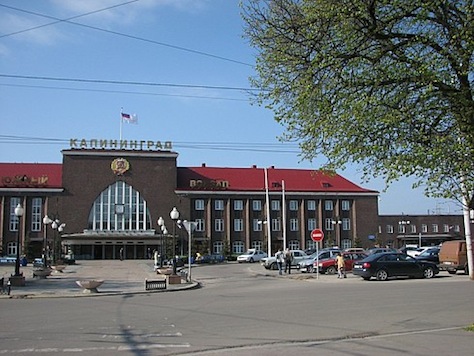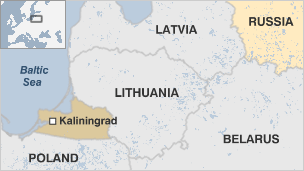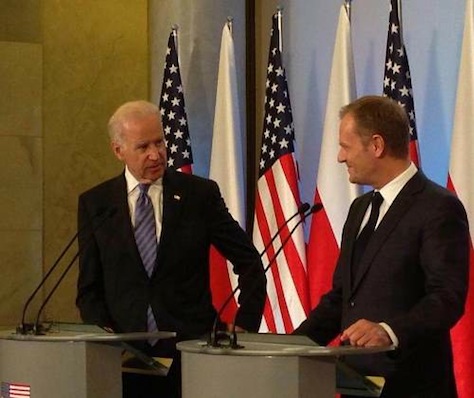If Russia can get away with annexing Crimea from Ukraine to correct a ‘historical mistake,’ perhaps Germany should be able to retake Kaliningrad? ![]()
![]()
The Soviet Union took the tiny strip of land, nudged today along the Baltic coast between Poland and Lithuania, in 1944 at the end of World War II from Nazi Germany — just a decade before Soviet leader Nikita Khrushchev transferred Crimea (perhaps in a drunken stupor) from the Russian Soviet republic to the Ukrainian Soviet Republic. Previously known as Königsberg, it’s the homeland of one of the world’s most renowned German philosophers, Immanuel Kant.
Today, it’s an exclave separated from the rest of the Russian Federation — but it’s a strategically crucial piece of real estate for Russia. Kaliningrad gives Russia an ice-free port on the Baltic Sea and territory within the heart of the European Union surrounded by North Atlantic Treaty Organization allies.
The city of Königsberg was arguably even more important to Germanic culture and history before Kant was ever born. It was the capital of the State of the Teutonic Order, the crusader state, between 1457 and 1525, when the Teutonic State became the Duchy of Prussia, and Königsberg continued to serve as the Prussian capital until 1701, when Berlin became the capital. Russia occupied the ciy for the first time between 1758 and 1764, during the Seven Years’ War. Like many European cities, it was almost completely destroyed during the Second World War.
* * * * *
RELATED: Forget 1938. Here’s another historical analogy — 1914.
* * * * *
An eye for an eye, a tooth for a tooth, a Crimea for a Kaliningrad.
Right? (In the meanwhile, Karelia, here’s your chance — with Russian president Vladimir Putin’s focus diverted to Ukraine, you’ll never have a better opportunity to make a bolt to Finland).
So wonders Gabrielle Tétrault-Farber in a plucky piece on Thursday for the Moscow Times:
Inesis Feldmanis, head of the Faculty of History and Philosophy at the University of Latvia, said he believed Kaliningrad’s annexation by the Soviet Union was, similarly, “an error in history.” So, what is the difference between Crimea and Kaliningrad? The German region of Konigsberg was decimated during World War II, and in 1941 Stalin ordered the deportation of 800,000 Konigsberg Germans from the city and surrounding region to Siberia and Kazakhstan, fearing they would be disloyal in the war against Nazi Germany. Most of the remaining Germans fled or were deported after the war, while Soviet immigration and Russification quickly transformed the cultural landscape of the 15,100-square-kilometer exclave. Kaliningrad, which as Konigsburg served as the capital of Prussia in the 1500s and 1600s and was home to German philosopher Immanuel Kant, still exudes Germanic history, despite having served as a closed military area in Soviet times. But today, Germans make up a mere 0.8 percent of the Russian exclave’s population of 940,000 — a far cry from Crimea’s significant ethnic Russian population and majority of Russian speakers.
For many reasons, the Germans never contested the Soviet land grab after World War II — Kaliningrad was in 1944 contiguous to Lithuania, which was then part of the Soviet Union, so it made more geographic sense than perhaps today. Germany’s division also made it more difficult — after the split between the Soviet-aligned East Germany and West Germany, it would have been incredibly difficult for West Germany to make a claim on Kaliningrad. After all, West Berlin’s isolation from the rest of West Germany was tricky enough (and, interestingly, one of the reasons rent in Berlin today remains so affordable).
Moreover, Germany’s post-war transition to pacifism would have made West German leaders throughout the 20th century reticent to retake the land. In 1990, leaders like British prime minister Margaret Thatcher were already terrified enough of German reunification that she secretly asked Soviet leader Mikhail Gorbachev to help slow the process down. So a German attempt to retake Kaliningrad a year later upon the Soviet Union’s breakup might have been encountered obstacles.
By that point, Kaliningrad was home to Russia’s Baltic Sea naval fleet.
Moreover, the area’s destruction during World War II allowed the Soviets to remake the city fairly rapidly — as of the 2010 census, the Kaliningrad oblast has a population of 942,000, 86.4% of which was Russian, 3.7% of which was Ukrainian, 3.6% of which was Belarusian and just 0.8% of which was ethnically German.
Kaliningrad was so militarized during the Cold War that the historic city was closed to tourists. The Russian military presence is less today, but the areas still houses a base that Russia could conceivably use for any defensive or offensive purpose — including, Polish, Lithuanian, Estonian and Latvian leaders fear, launching an attack on former Soviet states and satellites, or even housing nuclear weaponry.
All joking aside, that strategic capability is what makes Kaliningrad so special in today’s global showdown over Ukraine and Crimea and the sour turn of Russian sentiment against the United States and Europe.
It’s not exactly paranoia on behalf of Poland and Lithuania — Russia earlier this month conducted a tactical exercise involving over 3,500 service members of the Russian Baltic Fleet.
That’s chief among the reasons that US vice president Joe Biden (pictured above, left, with Polish prime minister Donald Tusk) traveled earlier this week to Warsaw and to Vilnius, reassuring the Polish and Lithuanian governments that the United States would back them as NATO allies:
Tusk, however, expressed the acute concern of a leader with a new, unpredictable conflict suddenly on his doorstep, saying that Russian President Vladimir Putin’s intervention in Ukraine “increases the risk in Eastern Europe, but it also has global implications.” “It is a challenge for the whole world,” Tusk said. “It is not just Poland, but all of Europe must speak in a strong voice.” Tusk’s remarks captured the mounting worries sweeping through Eastern Europe as Putin resists international calls to withdraw from Crimea.


